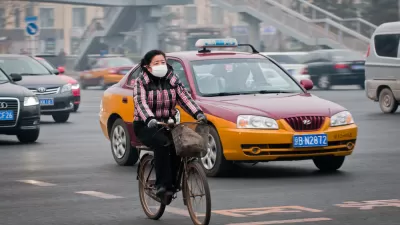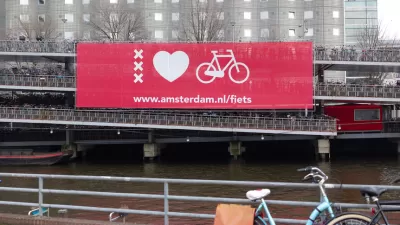Self-driving car companies have proposed equipping bikes, pedestrians, and even pets with the ability to communicate their positions wirelessly. But should autonomous cars really need the help?

"The most difficult detection problem that autonomous vehicle systems face"—according to a 2017 report from the Institute of Electrical and Electronic Engineers—is bicycles.
That's a blind spot with life-or-death stakes, so companies like Ford, Tome Software, and Trek Bicycle have proposed a possible solution: give bikes the ability to simply tell autonomous cars where they're going. But Christina Bonnington argues in Slate that bicycle-to-vehicle communication—or its logical extension, vehicle-to-everything—is just a crutch for fundamentally inadequate detection technology.
After comparing the logistics of distributed communication to the high-performing detection systems boasted by some AV companies, like Uber and Waymo, Bonnington concludes:
"Bicycle-to-vehicle communication is a good idea and could be useful in certain scenarios, such as when visibility is low—at night or in the rain—or on tricky, twisty back roads with blind corners. But if cars are going to drive the roads without human help, they need to be able to handle all of the challenges that come with it, regardless of whether they’re wirelessly connected to the world around them."
FULL STORY: The Cyclist Problem

Maui's Vacation Rental Debate Turns Ugly
Verbal attacks, misinformation campaigns and fistfights plague a high-stakes debate to convert thousands of vacation rentals into long-term housing.

Planetizen Federal Action Tracker
A weekly monitor of how Trump’s orders and actions are impacting planners and planning in America.

In Urban Planning, AI Prompting Could be the New Design Thinking
Creativity has long been key to great urban design. What if we see AI as our new creative partner?

Pedestrian Deaths Drop, Remain Twice as High as in 2009
Fatalities declined by 4 percent in 2024, but the U.S. is still nowhere close to ‘Vision Zero.’

King County Supportive Housing Program Offers Hope for Unhoused Residents
The county is taking a ‘Housing First’ approach that prioritizes getting people into housing, then offering wraparound supportive services.

Researchers Use AI to Get Clearer Picture of US Housing
Analysts are using artificial intelligence to supercharge their research by allowing them to comb through data faster. Though these AI tools can be error prone, they save time and housing researchers are optimistic about the future.
Urban Design for Planners 1: Software Tools
This six-course series explores essential urban design concepts using open source software and equips planners with the tools they need to participate fully in the urban design process.
Planning for Universal Design
Learn the tools for implementing Universal Design in planning regulations.
planning NEXT
Appalachian Highlands Housing Partners
Mpact (founded as Rail~Volution)
City of Camden Redevelopment Agency
City of Astoria
City of Portland
City of Laramie




























